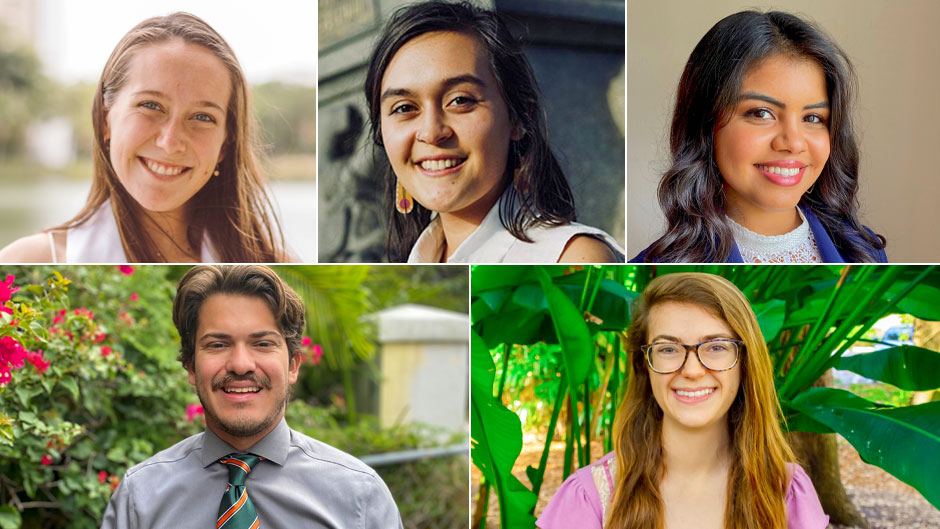One student will study how cities in tropical climates are adapting to global warming, and whether all residents are being treated equitably. Another will research the endangered salamanders of California to see if climate change is threatening their existence.
They will be doing this with the benefit of a scholarship from the National Science Foundation (NSF) that will help fund their graduate research. In all, five University of Miami students recently received awards from the NSF’s Graduate Research Fellowship, two of whom will use the award to pursue their doctoral degrees at the University.
The prestigious award requires a project proposal based on students’ existing research projects, and recipients acquire a grant of $34,000 for three years to stay focused on their research during graduate school.
“It’s a very big deal,” said April Dobbins, director of the University’s Office of Prestigious Awards and Fellowships. “Financially, this fellowship gives students so much flexibility. They can go to the graduate school of their choice and have this apply, so it opens a lot of doors for students.”
Although this is not the first year that multiple University students have received the fellowship award, Dobbins credits the consistent group of recipients to a collaborative two-day workshop organized each fall by her office, along with Tatiana Perrino, associate dean at the Graduate School and professor of public health sciences, and Helena Solo-Gabriele, associate dean of research at the College of Engineering and professor of environmental engineering. Any seniors or graduate students interested in applying for the fellowship next year should look for e-mails from their college or the Graduate School next fall, Perrino said. Applications are typically due in October.
The University’s student recipients of the NSF Graduate Research Fellowship for 2021:
Lynée Turek-Hankins, a Ph.D. student in environmental science and policy at the Abess Center for Ecosystem Science and Policy, will delve into whether two federal policies to alleviate the energy burden on low-income households are actually doing so in light of stressors like worsening weather extremes due to climate change, or the COVID-19 crisis. She is also looking into equitable climate adaptation policies in places with tropical or hot climates, like Miami.
Maisy Lam is an electrical engineering major graduating this May. She plans to pursue her Ph.D. from the Massachusetts Institute of Technology in the fall. At the University, she worked with Onur Tigli, associate professor of electrical and computer engineering, to explore and improve upon existing energy harvesting and power generation techniques for medical device implants. Using this new technology would allow patients with medical device implants to have a much smaller and efficient power generator in their body. It would also give these patients an alternative to batteries, which often need costly surgical replacements.
Joshua Dominguez is a marine sciences and biology major graduating this May. As an undergraduate at the Rosenstiel School of Marine and Atmospheric Science, Dominguez studied an invasive species of brittle sea star in the Atlantic Ocean. He will use his fellowship to pursue his Ph.D. at the University of California, San Diego. There, he plans to study the community ecology of highland lakes in the Sierra Nevada mountain range.
Leyna Stemle, a second-year biology and ecology Ph.D. student, will use her fellowship to concentrate on documenting the population dynamics of two endangered California salamander species—the Santa Cruz Long Toed Salamander and the California Tiger Salamander—while also collecting data that can be used to conserve and manage the two species. Both species have noticeably declined in the past 40 years as climate change threatens to dry up the ponds where they reproduce.
Corinne Allen, a marine science and biology major, graduated from the University in December. She will pursue her Ph.D. at the University of Melbourne in Australia, and her research focuses on understanding the mechanisms behind heat tolerance in corals. Given that the increasing frequency and severity of marine heat waves is largely responsible for the decline in coral populations, this knowledge is urgent, Allen said. She hopes her research can provide insight into the key traits and pathways of the coral heat stress response to inform effective conservation and management strategies to ensure a healthier future for coral reefs.

